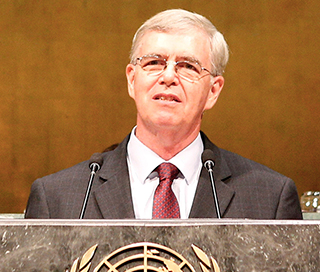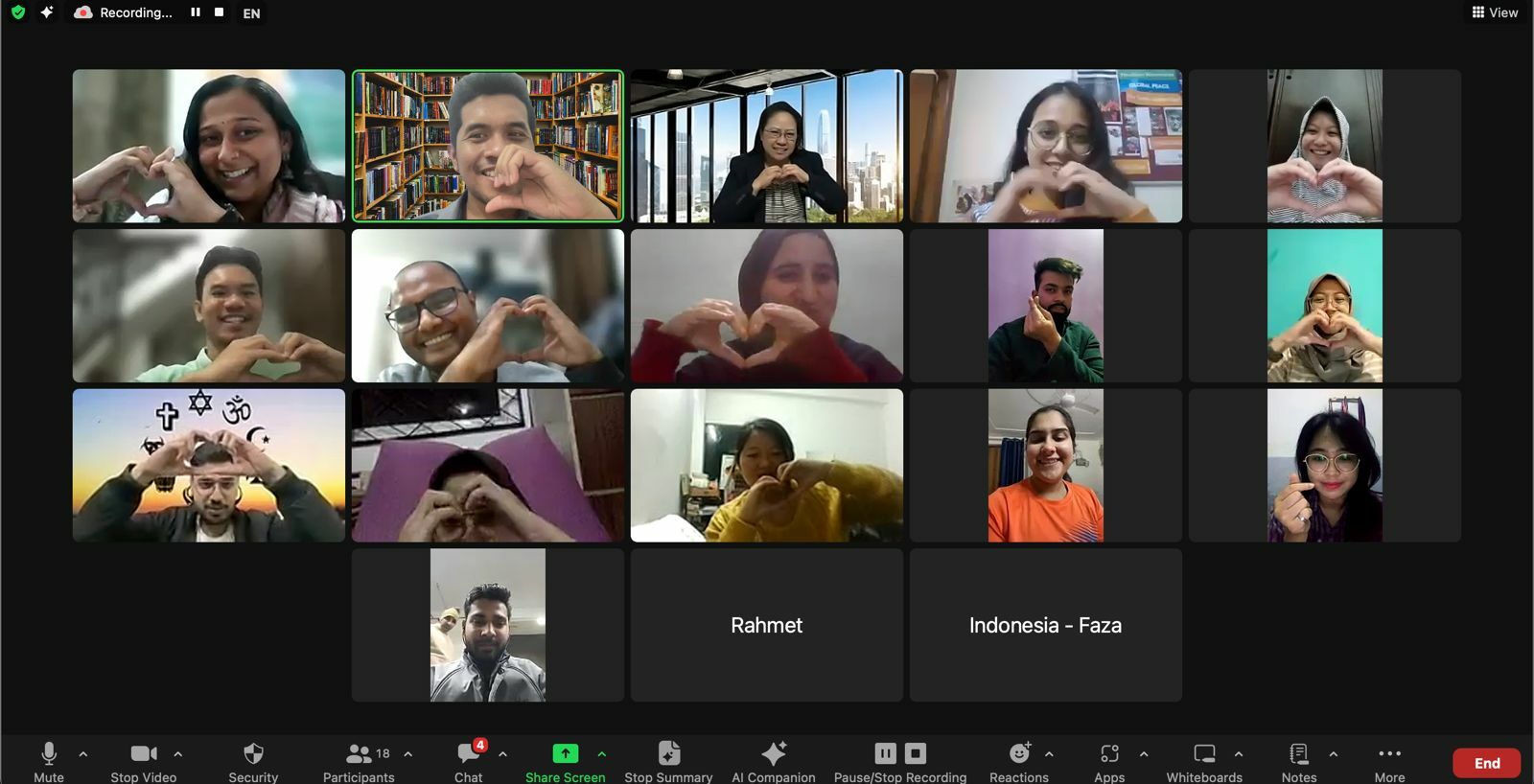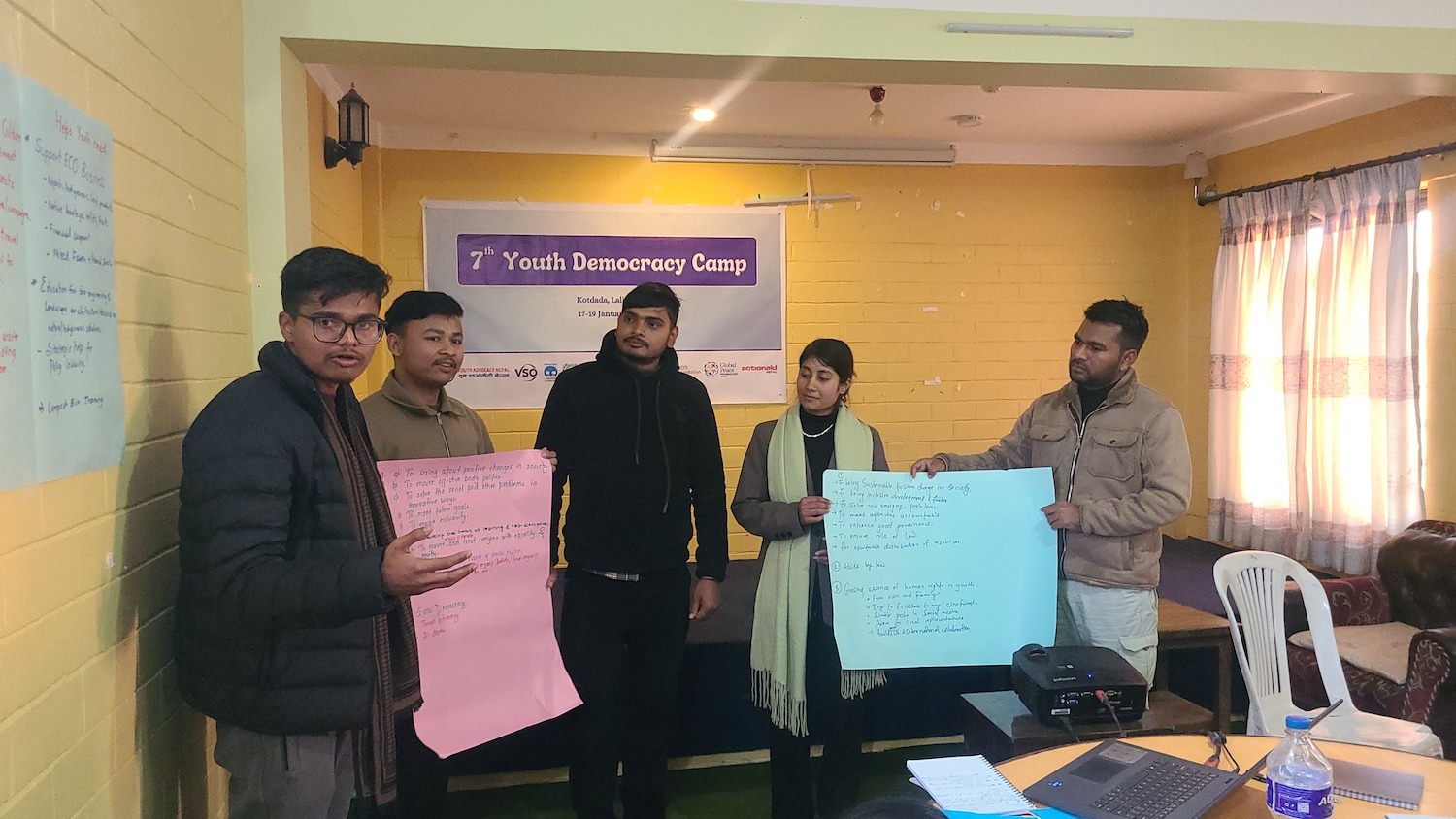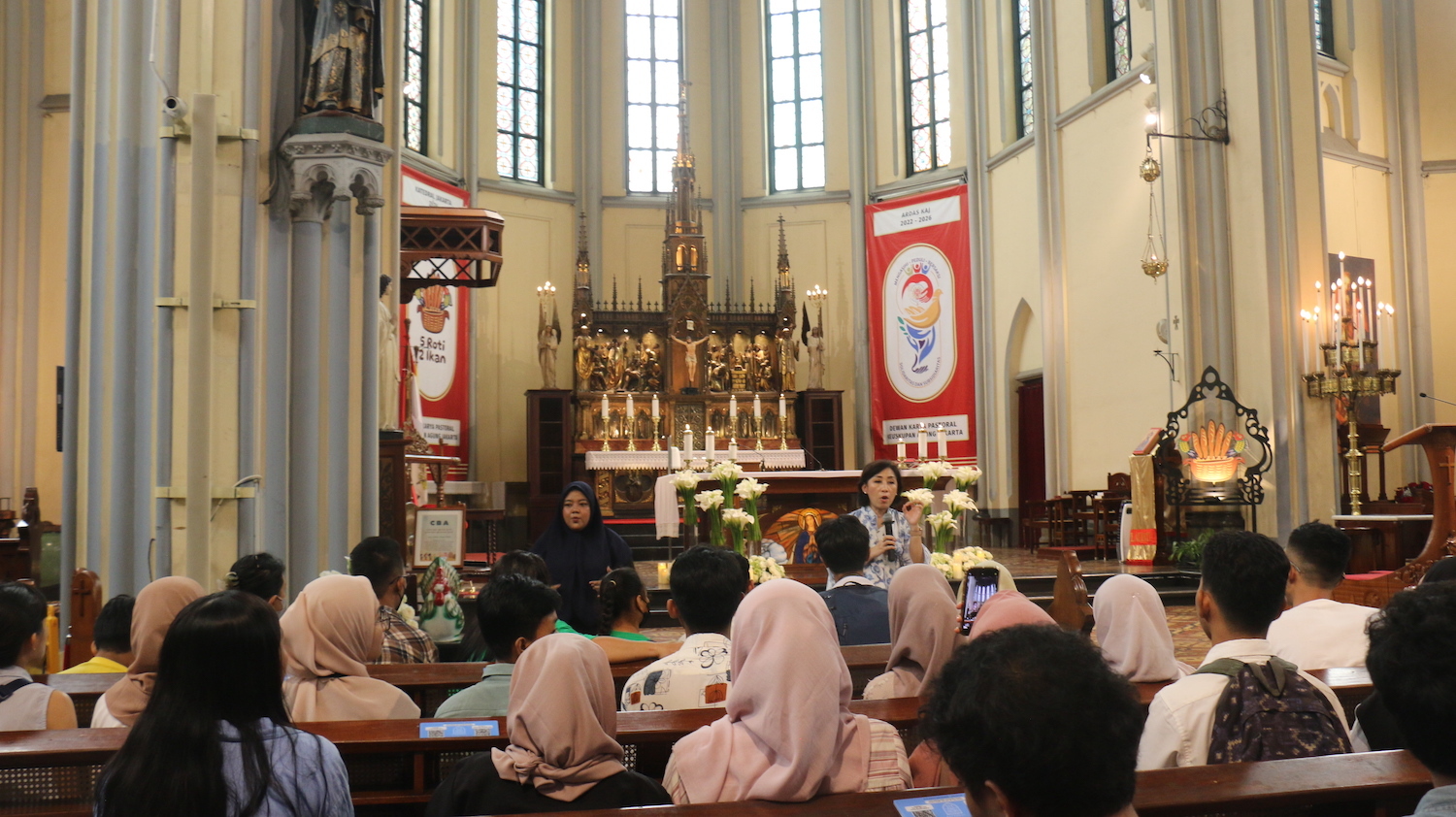New York, New York | August 18, 2015
“Moral and Innovative Leadership: Vision, Service, Entrepreneurship”

James P. Flynn speaking at the United Nations Forum
Your Excellencies, honored guests, IYLA participants:
Let me begin by appreciating the distinguished panel for contributing their insights and inspiration to this important session. Also special thanks to the Paraguay Mission for serving as the lead sponsor for this UN forum, along with the Permanent Missions of 11 other nations. The Global Peace Foundation is proud to join with our partners in collaborating on this forum and in co-convening the IYLA program each year.
Also I would like to especially appreciate all of you, the participants of the International Young Leaders Assembly 2015, representing more than 100 nations. Your investment of time, energy and focus to address critical issues facing our world today is admirable. I believe that you are here because you care, because you want to make a positive difference, and because you are ready to take action for the greater good.
It is significant that this IYLA is convening here at the UN, the pre-eminent global institution dedicated to building peace. In the 70 years since its founding, the UN has expended tremendous effort and resources to promote peace and security. Yet despite such dedicated efforts, tragically our world is still plagued by conflict, corruption, and poverty.
Clearly no one institution alone, no matter how comprehensive its scope, can solve the fundamental problems of the human situation. It will take all of us as global citizens, working together in common cause, to transform our world. That is why it is meaningful that you, as young leaders, are here to discuss, engage, and aspire together to make a difference.
Our world has changed dramatically within just a few decades. Technology and globalization are impacting the lives of people everywhere, driving change at a breathtaking pace. We can communicate, transact and travel with an ease previously unimaginable.
Yet with the great promise of this 21st century, we continue to face dire realities and ominous challenges everywhere. To cite just two examples:
- The Institute for Economics and Peace estimates the global cost of violence containment at nearly $9.5 trillion.
- According to the World Health Organization: 6.3 million children under the age of five, died in 2013 – and more than half of these early childhood deaths –more than 3 million – could have been prevented with access to simple, affordable interventions.
Conflict and corruption on every continent cripple human progress toward peace and prosperity.
Our most pressing challenge today is an ethical one. Our technology can gather massive data on our browsing habits and consumer preferences, but cannot help us to understand each other, respect each other, or forgive each other. General Omar Bradley most aptly described the dilemma we face, when he said:
Ours is a world of nuclear giants and ethical infants. We know more about war than we know about peace, more about killing than we know about living. We have grasped the mystery of the atom and rejected the Sermon on the Mount.
We are faced with a significant gap between our external development and our ethical maturity. That gap is a form of deficit far more alarming than any trade or budget shortfall. It is, in fact, a values deficit.
Technology has driven rapid development, but itself is value neutral. It improves our quality of life, but can also be used for weapons of mass destruction. We are in dire need of ethical leadership, leadership with moral authority, to address this debilitating shortfall in values that undermines the promise of the 21st century.
Transformative leaders of the 20th century – Gandhi, King, Mandela – were such persons of moral authority. Of the importance of values, Dr. Martin Luther King Jr. said “this is a moral universe, and there are moral laws of the universe just as abiding as the physical laws.”
The theme of this forum is quite meaningful: “Moral and Innovative Leadership: Vision, Service and Entrepreneurship.” This unique juxtaposition – moral and innovative leadership – encapsulates the qualities needed for leaders today. A moral leader is guided by an ethical framework, and acts with integrity. GPF Chairman, Dr. Hyun Jin Preston Moon, who first introduced the framework of moral and innovative leadership in 2010 said:
The role of the moral leader is to lay out the vision and set a course toward it, guided by universal principles and values. The moral leader lives for the greater good, looking beyond selfish interests whether personal, sectarian, or even national.
On the foundation of a solid ethical framework, innovative leadership can tap the wellspring of innate human creativity, ingenuity, and the power of innovation to address even the most intractable social problems.
Why is such leadership so needed today? Globalization has brought profound and rapid change, and with it, heightened uncertainty. British philosopher Jonathan Sacks writes that:
“What is specific to our present situation is the sense that change is running ahead of our ability to chart a course for a shared future. Our technological powers grow daily, while our moral convictions become ever more hesitant and confused. “
With dramatically changing social institutions and norms, and uncertainty about the future, it is understandable that some may face deep struggles about meaning, purpose and identity. One of our great dilemmas today, is how some are attracted to radical groups like ISIS.
Yet such groups provide a persuasive, yet deeply flawed, sense of certainty, belonging and identity. With explanations framed in religious terms but twisted by extremist interpretations, such groups present a dangerous challenge to modern civil society that must be addressed. A global consensus is urgently needed that uplifts our common humanity as our most essential identity, and that affirms the universal values necessary for a diverse world of freedom and peace.
It is our conviction that all people – regardless of race, religion, ethnicity or station in life – share a common essence and heritage – our “humanness” extends beyond even our most pronounced external differences. We are all part of the one human family. And we are one family because we all share a common origin, the Creator God. Thus we at the Global Peace Foundation believe that a simple yet powerful vision statement that can inspire our common effort to build a world of sustainable peace – is One Family under God.
The essence of our humanity– and of life itself – is intangible, and, we could say, spiritual in nature. We naturally and intuitively recognize that every person has value, has worth. That is why we make great efforts to save even one human life. Our value as human beings is imbued in us by the Creator.
Mother Teresa recognized these simple but profound truths; she said:
“Today, if we have no peace, it is because we have forgotten that we belong to each other – that man, that woman, that child – is my brother or my sister. If everyone could see the image of God in his neighbor, do you think we would still need tanks and generals?”
In this realization, we can find new solutions to the problem of difference. More than political, economic or military power, the power that can transform our world is the power of the human spirit. It is the human spirit that aspires to greatness, that can overcome even the most serious obstacles, and calls forth the noble qualities of our character.
If you adopt the framework of moral and innovative leadership, you are choosing to guide your path by the compass of time-honored truths, while you make full use of the tools of the 21st century. You can be leaders with integrity, who at the same time engage with personal and collective creativity to develop innovative solutions for our challenged world.
Let a noble vision guide your steps. Place your motivation on the highest plane. Tap your entrepreneurial and innovative spirit to dream big and act big – to build a world free of conflict and corruption, free of poverty and disease, and filled with opportunity and well-being for every member of the global human family.
Again we are grateful to the Paraguay Mission and co-sponsoring missions here at the United Nations, for hosting this very meaningful Assembly.
Thank you for your kind attention.



